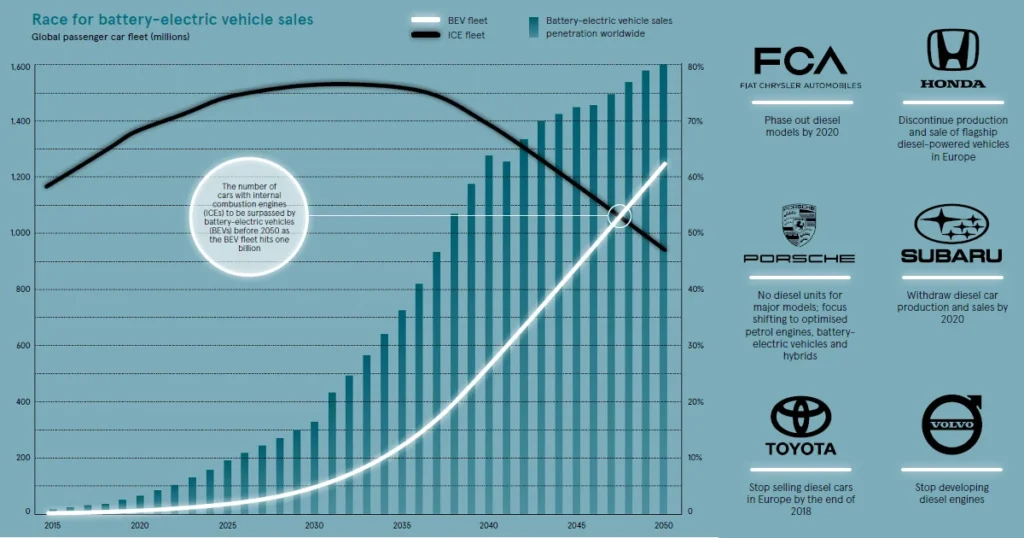The rise of electric vehicles is having a significant impact on the tech industry and beyond. As the automotive industry continues to shift towards electric vehicles, there are major implications for technology companies, infrastructure, and the environment. This shift is driving innovation in battery technology, charging infrastructure, and autonomous driving systems, creating new opportunities and challenges for the tech industry. Additionally, the widespread adoption of electric vehicles is reshaping the energy sector and leading to a re-evaluation of transportation and urban planning. Overall, the rise of electric vehicles is not only transforming the automotive industry but also influencing various aspects of technology and society.
The transition to electric vehicles is sparking interest and curiosity in various fields, such as sustainable energy, transportation logistics, and urban development. As more consumers and businesses consider the switch to electric vehicles, the demand for related technologies, such as energy storage solutions and smart grid systems, is growing. Furthermore, the emergence of electric vehicles is reshaping the automotive supply chain and creating new business opportunities for companies involved in manufacturing, materials, and infrastructure development. This shift is also prompting discussions about the impact of electric vehicles on air quality, public health, and the reduction of greenhouse gas emissions. In essence, the rise of electric vehicles is leading to a broader reimagining of how we approach transportation and technology.
The Rise of Electric Vehicles
Electric vehicles (EVs) have been gaining significant traction in recent years as the world seeks sustainable transportation solutions. The rise of EVs is driven by advancements in battery technology, government incentives, and growing environmental awareness among consumers. As traditional car manufacturers and tech companies invest heavily in EV development, the market for electric vehicles is expanding rapidly, with a wide range of options now available to consumers.
Furthermore, the shift towards EVs is not only reshaping the automotive industry but also impacting various sectors such as energy, infrastructure, and the tech industry. This transition towards electric vehicles is poised to bring about significant changes in the way we think about transportation, energy consumption, and environmental sustainability.
Impact on the Automotive Industry
The rise of electric vehicles is revolutionizing the automotive industry, prompting traditional automakers to invest in electric and hybrid vehicle technologies. This shift is not only changing the way vehicles are powered but also driving innovation in design, manufacturing, and supply chain management. As consumers increasingly prefer electric vehicles, automakers are compelled to adapt to this trend by expanding their electric vehicle offerings and developing new business models to support sustainable transportation.
Moreover, the transition to electric vehicles is also influencing the automotive aftermarket, as the maintenance and repair of EVs require different skill sets and infrastructure compared to traditional internal combustion engine vehicles. This shift is creating new opportunities and challenges for the automotive industry, leading to a reimagining of the entire vehicle lifecycle.
Technological Advancements in EVs
The rise of electric vehicles is driving significant technological advancements in battery technology, energy management systems, and vehicle connectivity. As the demand for longer range, faster charging, and more efficient batteries grows, tech companies and research institutions are investing in the development of next-generation battery technologies such as solid-state batteries and advanced lithium-ion cells. Additionally, the integration of smart features, autonomous driving capabilities, and over-the-air updates in electric vehicles is pushing the boundaries of innovation in the automotive tech sector.
Furthermore, the electrification of transportation is fostering the convergence of the automotive and tech industries, leading to collaborations and partnerships between traditional automakers and tech companies. This synergy is driving the development of new software platforms, user interfaces, and connectivity solutions tailored for electric vehicles, paving the way for a new era of smart and sustainable mobility.
Environmental Impact and Sustainability
Electric vehicles play a crucial role in reducing greenhouse gas emissions and air pollution, thereby contributing to environmental sustainability. The adoption of EVs leads to a decrease in the dependence on fossil fuels and helps mitigate the environmental impact of traditional gasoline-powered vehicles. Moreover, the integration of renewable energy sources such as solar and wind power for charging EVs further enhances their environmental benefits and contributes to the overall goal of achieving a greener and more sustainable transportation ecosystem.
Additionally, the lifecycle analysis of electric vehicles, including their manufacturing, operation, and end-of-life recycling, is driving continuous improvements in sustainability practices across the automotive and tech industries. As the demand for sustainable transportation solutions continues to grow, the focus on environmental impact and resource efficiency is becoming a key driver of innovation and competitiveness in the electric vehicle market.
Challenges and Opportunities for the Energy Sector
The widespread adoption of electric vehicles presents both challenges and opportunities for the energy sector. While EVs offer the potential to reduce greenhouse gas emissions and support the integration of renewable energy sources, they also pose challenges related to the increased demand for electricity and the need for smart grid infrastructure. As a result, energy companies are exploring innovative solutions such as vehicle-to-grid technology, energy storage systems, and demand response mechanisms to effectively manage the charging and grid integration of electric vehicles.
Furthermore, the electrification of transportation is driving the evolution of the energy market, as utilities, grid operators, and renewable energy providers seek to develop new business models and services tailored for electric vehicle charging. This shift is fostering a more interconnected and dynamic energy ecosystem, where the convergence of transportation and energy systems is creating new opportunities for sustainable energy management and infrastructure development.
Impact on Infrastructure and Urban Development
The rise of electric vehicles is influencing infrastructure and urban development, as cities and communities adapt to accommodate the charging needs of EVs. The deployment of public charging stations, the integration of charging infrastructure in residential and commercial buildings, and the development of smart parking solutions are becoming essential components of urban planning and transportation systems. This shift towards electric mobility is reshaping the way cities design their transportation networks and public spaces, with a focus on promoting sustainable and accessible charging options for EV owners.
Moreover, the electrification of transportation is driving the convergence of transportation and digital infrastructure, as smart city initiatives and mobility platforms seek to optimize the integration of electric vehicles into urban environments. This transformation is sparking innovation in urban mobility, connectivity, and data analytics, as cities leverage technology to create more efficient and sustainable transportation ecosystems that support the widespread adoption of electric vehicles.
Implications for Consumer Electronics and Connectivity
The rise of electric vehicles is impacting consumer electronics and connectivity, as the integration of advanced infotainment systems, telematics, and vehicle-to-home connectivity becomes increasingly prevalent in EVs. The demand for seamless connectivity, personalized user experiences, and smart home integration is driving collaboration between automotive and tech companies to develop innovative solutions tailored for electric vehicles.
Furthermore, electric vehicles are influencing the design and development of consumer electronics, as the need for more energy-efficient and high-performance components aligns with the requirements of EV technologies. This synergy between electric vehicles and consumer electronics is shaping the future of connected mobility, where the seamless integration of devices, services, and data-driven experiences is redefining the relationship between vehicles and the broader ecosystem of consumer technology.
Global Economic and Geopolitical Implications
The rise of electric vehicles is impacting the global economy and geopolitical landscape, as countries and regions compete to lead the transition towards electric mobility and sustainable transportation. The development of domestic electric vehicle industries, the expansion of charging infrastructure, and the investment in renewable energy technologies are becoming key strategic priorities for governments and industry stakeholders around the world.
Moreover, the shift towards electric vehicles is influencing global trade patterns, supply chain dynamics, and investment flows, as the demand for EV components such as batteries, electric motors, and charging infrastructure drives new opportunities for collaboration and competition among nations. This shift is reshaping the automotive and tech industries on a global scale, with far-reaching implications for economic development, innovation, and the pursuit of sustainable mobility solutions.
The Rise Of Electric Vehicles: Impact On The Tech Industry And Beyond
| Topic | Description |
|---|---|
| Electric Vehicles (EVs) | EVs are gaining popularity as a more sustainable and environmentally friendly mode of transportation. |
| Impact on Tech Industry | The rise of EVs is driving innovation in battery technology, charging infrastructure, and autonomous driving systems. |
| Job Opportunities | The shift towards EVs is creating new job opportunities in manufacturing, software development, and infrastructure deployment. |
| Environmental Impact | EVs are contributing to reduced carbon emissions and cleaner air, leading to a positive impact on the environment. |
| Challenges | Challenges such as battery production, charging infrastructure expansion, and recycling need to be addressed for widespread adoption of EVs. |
The rise of electric vehicles is not only transforming the transportation industry but also driving significant changes in the tech industry and beyond. From innovative battery technologies to new job opportunities, the impact of EVs is far-reaching and has the potential to create a more sustainable future for generations to come.



